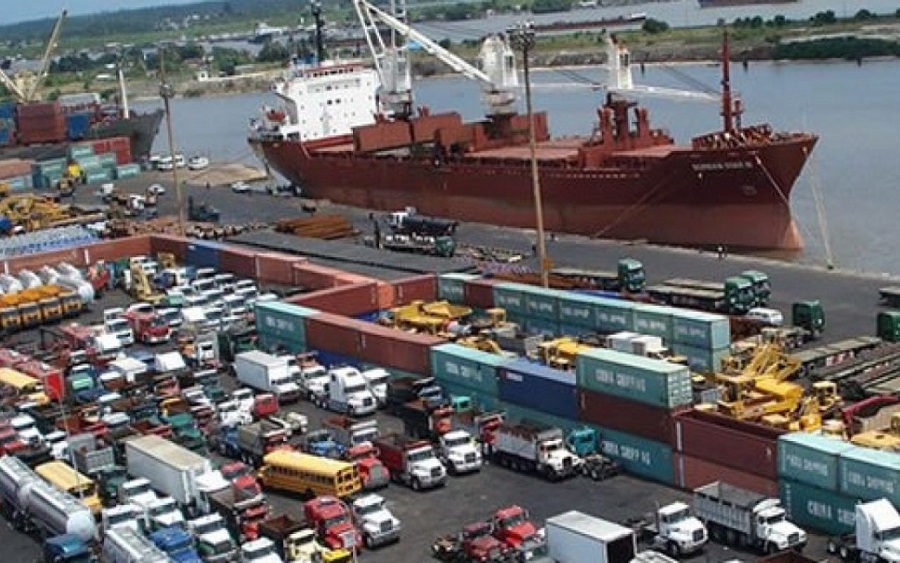It is more expensive to ship goods from the European Union to Nigeria, compared to other African countries like Ghana and South Africa. This is according to a report by SBM Intelligence, which was published last week.
The Details: The report, which took three months to compile and analyse, revealed that South Africa’s Durban Harbour is the least expensive in terms of shipping charges, terminal charges, and the cost of transporting goods to local warehouses.
In the same vein, the Tema Port in Ghana is less expensive compared to what obtains at Nigeria’s Apapa Port. The report chillingly revealed that Nigeria’s Apapa Port is five times more expensive than Durban Harbour and three times more expensive than Tema Port. Part of the report said:
“SBM tracked shipments over a period of three months to three ports in Africa and came up with this average costs of first, shipping goods in from the EU, the terminal charges that containers pay while they are in those ports, and the average cost of local transportation from the port to selected warehouses within the port cities.
“The costs for the Apapa Port in Lagos are by far the highest, five times higher than in Durban, South Africa, and three times higher than in Tema, Ghana. While each of the component parts of this dataset, shipping charges, terminal charges and local transport, are highest for Lagos, it is local transport, 10 times the cost in Lagos than in both Durban and Tema, that really makes Lagos an expensive place to do business in.”
[READ MORE: Reps investigate N600 billion monthly revenue loss at Apapa, Tin Can ports)
More Details: The SBM report went further to reveal that at the Apapa Port, importers spend an average of $374 in shipping charges. This is far more than the $247 importers pay at the Durban Harbour for the same purpose. Meanwhile, at the Tema Port, the average shipping cost is $321.
In terms of terminal charges, people shipping goods through Nigeria’s Apapa Port pay an average of $457, compared to $180 average costs at the Durban Harbour and $280 at Tema Port.
When transporting imported goods from Nigeria’s Apapa Port to local warehouses, businesses spend an average cost of $2,050. This is far more than the $208 it costs to transport containers from Durban Harbour to South African warehouses. In Ghana, it costs just $285 to transport containers to local Ghanaian warehouses.
What this means: Perhaps this explains why there is always heavy congestion at the Apapa Port, which serves as Nigeria’s main port. Earlier this year, the Nigerian Ports Authority (NPA) declared an emergency at the port due to a buildup of massive congestion. A temporary solution was even put in place to divert vessels to alternate terminals. But it appears the root cause remains unsolved.
The SBM report also raises questions about Nigeria’s ease of doing business. According to Nairametrics’ commentator and economic expert, Kalu Aja, “if it is easy to do business in Nigeria, then importers should be able to clear goods faster and cheaper.”
Recall that Nigeria recently moved up fifteen places to number 131 in the latest ease of doing business index, as earlier reported by Nairametrics.
Commenting further, Kalu Aja noted that proper implementation of the Africa Continental Free Trade Area (AfCFTA) could enable Nigeria to become a major export-import hub. He said:
“With the ‘open borders’ of AfCFTA, that’s a key advantage as Nigeria could become an import-export hub. But then again, Nigeria would need to do a lot of work to restructure its port system before it can fully take advantage of AfCFTA.”
Meanwhile, Nairametrics had reported that the Federal Government claimed it has started positioning the nation to benefit fully from the AfCFTA and take advantage of the opportunities it provides.
The Managing Director, Nigerian Ports Authority (NPA), Hadiza Bala-Usman, stated that the development would ensure smooth transmission of goods and investments through the ports. According to her, it would boost the trade relationship between Nigeria and other countries.
Why it matters: Infrastructure upgrade creates opportunities for the nation. The deplorable state of the ports in Nigeria has become a trade barrier, preventing connectivity, which is costly to companies depending on the ports for importing and exporting of goods. Bala-Usman said with this removed, and dredging of seaports, as well as the elimination of corruption, and manual processes in the sector, enormous opportunities would be recorded.
You may download the SBM Intelligence report by clicking here.
